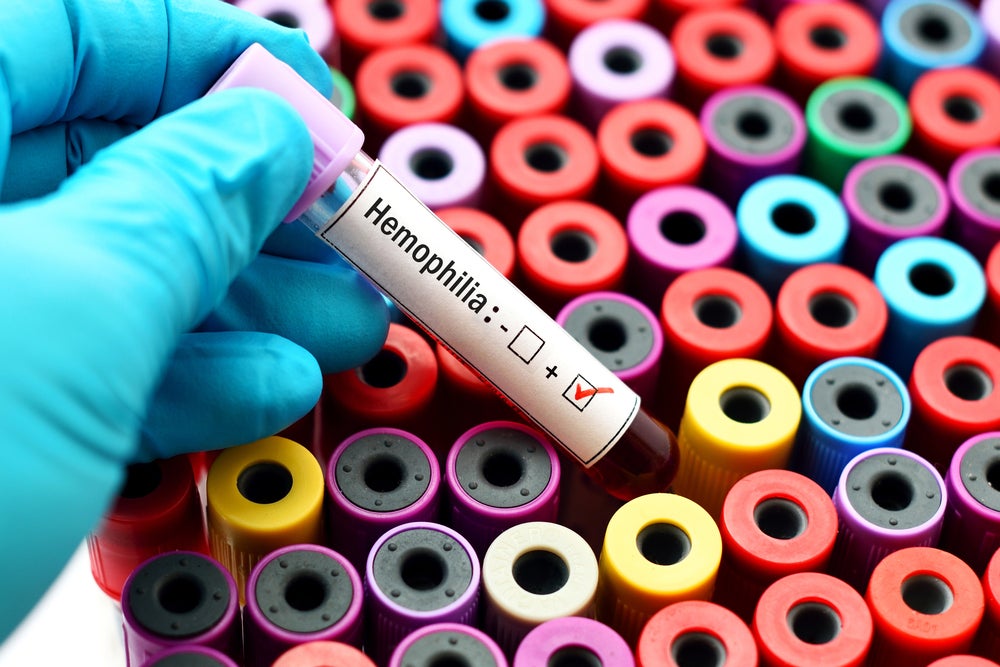On 24 July 2024, Pfizer announced a positive data readout from the Phase III AFFINE trial (NCT04370054) of its pipeline adeno-associated virus (AAV)-based haemophilia A gene therapy, girocotogene fitelparvovec.
This marks another step in Pfizer’s steady momentum in future-proofing its haemophilia portfolio, following the US Food and Drug Administration (FDA) and European Union (EU) approval of its haemophilia B gene therapy, Beqvez (fidanacogene elaparvovec), in the second quarter of the year. The AAV6-based girocotogene fitelparvovec demonstrated a statistically significant mean total annualized bleed rate (ABR) of 1.24 in the 15 months of follow-up after infusion, compared to a mean ABR of 4.73 from factor VIII (FVIII) replacement prophylaxis in the lead-in period. Regarding FVIII expression level in patients, 84% of recipients maintained factor activity of more than 5% at the end of the follow-up period. Serious adverse events were observed in 20% of patients. At the same time, Pfizer has yet to provide details on key hepatotoxicity events in the form of elevated aspartate (AST) or alanine aminotransferase (ALT) enzyme levels. Despite the positive results, the current efficacy and safety data are inadequate for the fast-follower gene therapy to demonstrate a clear enough clinical differentiation from the current market leader — BioMarin’s AAV5-based Roctavian (valoctocogene roxaparvovec).

Access deeper industry intelligence
Experience unmatched clarity with a single platform that combines unique data, AI, and human expertise.
With the first US commercial patient dosed in December 2023, Roctavian has enjoyed an uncontested space in hemophilia A gene therapy. Its FDA approval in June 2023 was based on the three-year data of its Phase III GENEr8 trial, from a cohort of 112 patients. Roctavian reduced the mean total ABR from the baseline of 5.4 to 2.6 over the observed period. Over a similar duration to the AFFINE trial (15 months), 88% of patients receiving Roctavian achieved FVIII activity equal to or more than 5% one year after infusion, as measured via chromogenic substrate assay. In terms of total ABR and FVIII activity, the performance of girocotogene fitelparvovec and Roctavian are only numerically similar.
Right now is too early to determine the robustness of new candidates
In the meantime, Pfizer has not revealed the full picture of the candidate’s efficacy, such as secondary endpoints such as the number of observed spontaneous bleeds, joint bleeds and other quality-of-life metrics. As FVII expression is expected to decline over several years, it is too early to determine if the candidate’s efficacy is more robust than Roctavian as further observation is needed to examine the long-term decline of factor expression after girocotogene infusion.
Comparing safety, girocotogene fitelparvovec performed similarly to Roctavian in terms of the occurrence of serious adverse events – 20% compared to Roctavian’s 18% within the first two years. The occurrence of elevated ALS/AST events, which affects the number of patients requiring corticosteroid prescription for side effect management, would be important to illustrate a meaningful differentiation from the competition.
Earlier-stage candidates show greater degree of innovation
Despite the relative novelty of gene therapies in haemophilia, the landscape of haemophilia A will see greater competitive pressure from well-established pharmaceuticals making safe bets with conventional clinical strategy and emerging biotechs adopting novel payload or vector designs. Roche’s AAV-based dirloctocogene samoparvovec (RG6357) has recently entered its Phase III KEYSTONE-1 with an expected cohort size of 85 patients and an estimated primary completion date of May 2027. ASC Therapeutics’s AVV-based candidate in a Phase I/IIa trial, ASC-618, approaches the competition with a novel transgene payload that differs from the mainstream B domain-deleted human FVIII construct. Furthermore, candidates in earlier stages show a greater degree of innovation, replacing AAV with a lipid nanoparticle vector and the human FVIII transgene with a high-fidelity CRISPR system, to provide enhanced safety, factor expression durability and the unique ability for redosing. Poseida Therapeutics’s P-FVIII-101 and Intellia Therapeutics’s haemophilia A programme are in their preclinical stages, gearing up for investigational new drug-enabling trials.

US Tariffs are shifting - will you react or anticipate?
Don’t let policy changes catch you off guard. Stay proactive with real-time data and expert analysis.
By GlobalDataGlobalData’s analyst consensus forecast anticipates the first-generation haemophilia A gene therapies – Roctavian, girocotogene fitelparvovec and dirloctocogene samoparvovec – will create a product segment with a value of $970 million by 2030. At the same time, the first-mover Roctavian is anticipated to reach $451 million in sales, while girocotogene fitelparvovec will contribute $354 million to Pfizer’s sales. Due to later market entry, RG6357 is forecasted to reach $165 million. Solving manufacturing constraints and improving gene therapy access worldwide would be vital to unlocking more potential from the segment.



